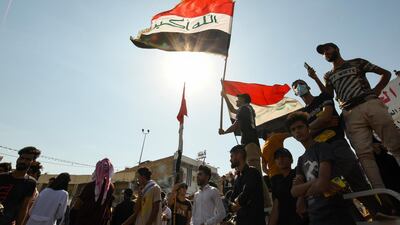The Iraqi Parliament has met one of the key demands of pro-reform protesters and laid the foundations for a new electoral process that divides the country into constituencies, potentially giving independent candidates a boost if they compete for seats inside the legislative body.
Previously, the country was treated as a single constituency and so favoured national parties with large funds and electoral machines. But after months of political wrangling amid mass demonstrations, lawmakers agreed on Saturday to divide the country into 83 constituencies, meaning candidates may only run in their local area.
The ruling, which is part of a new electoral law endorsed by Parliament last year, was among the demands voiced by protesters participating in widespread demonstrations that began in October 2019.
It addresses a number of the key concerns highlighted by protesters, who called for a law that allows more access for independent candidates and the division of the country into multiple constituencies.
The law introduces a new regulation that prevents political parties from running on unified lists, a practice that allowed them to sweep up parliamentary seats en masse.
Instead, Iraq’s 18 provinces will now be divided into multiple electoral jurisdictions with one parliamentary seat per 100,000 people.
The law also maintains the female quota, amounting to at least one-quarter of parliament's seats as well as the quota to ensure representation for religious minorities, including Christians and Yazidis.
Disagreement over the division of the electoral constituencies inside each province had delayed sending the law to President Barham Salih for final approval.
On Sunday, politicians voted on constituencies in 16 provinces, delaying the vote on the ethnically mixed, disputed provinces of Kirkuk and Nineveh due to differences among their ethnic and religious groups. They continued the vote on Monday and Wednesday, according to parliamentary statements.
For the protesters, the move is welcomed but many say more is required to ensure a fair electoral system.
"Yes, that's a victory but a minor one," Younsi Kahlifa, 23, told The National.
“We still have more demands for fair elections that include a real independent electoral commission and a law that governs political parties and their finances,” he said.
Protesters and activists are planning to run in the coming election but no progress has yet been made on registering their political entities, he said.
The current interim Prime Minister, Mustafa Al Kadhimi, has presented himself as a champion of the protesters’ demands, suggesting early elections to be held in June next year.
That date is still under discussion between political parties.

























